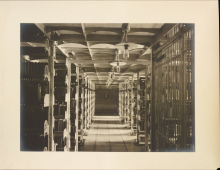You are here
Archives of Charles Scribner’s Sons
Related Topics
This collection consists of virtually all of the surviving records of Scribners (1846-1984), the New York City publisher, and reflect aspects of all of its publishing functions (soliciting and acquiring books, editing manuscripts, printing and manufacturing books, advertising and publicizing publications) and business concerns (book and magazine publisher, retail bookstore, subscription books department, educational books department, printing press and bindery, rare books department). Included are files of editorial correspondence with authors, manufacturing records about book production, advertising records, author contracts, a collection of dust jackets, book catalogs, ledgers, and photographs. While there are gaps in most of the series or record groups, there are records representative of all of the firm’s former permutations: Baker & Scribner, Charles Scribner & Co., Scribner, Armstrong & Co., Scribner, Armstrong & Welford, Scribner & Co., Charles Scribner’s Sons. The bulk of the material (1880s-1970s), however, dates from the period when the publisher bore its most familiar name, \Charles Scribner’s Sons.\ There is also material related to early publishers’ organizations and international copyright.
The family-owned nature of the company is reflected in the files of its successive heads: Charles Scribner, 1821-1871 (Princeton Class of 1840), Charles Scribner, 1854-1930 (Princeton Class of 1875), Arthur Hawley Scribner, 1859-1932 (Princeton Class of 1881), Charles Scribner, 1890-1952 (Princeton Class of 1913), Charles Scribner, 1921-1995 (Princeton Class of 1943), Charles Scribner, 1951- (Princeton Class of 1973). Company staff well-represented in the collection include Edward L. Burlingame (first editor of the firm's most successful magazine, Scribner's Magazine), Robert Bridges and Alfred Dashiell (Burlingame's successors), legendary editor Maxwell Perkins (editor of F. Scott Fitzgerald, Ernest Hemingway, and Thomas Wolfe), other editors (W. C. Brownell, John Hall Wheelock, Wallace Meyer, Harry Brague, Burroughs Mitchell, Elinor Parker), business manager and later vice-president Whitney Darrow, and London office managers (Charles Welford, Lemuel Bangs, Charles Kingsley, John Carter).
Some of the best-known authors that were published by Scribners in the 19th century are T. S. Arthur, Hjalmar Hjorth Boyesen, Noah Brooks, Frances Hodgson Burnett, Horace Bushnell, George Washington Cable, Richard Harding Davis, Mary Mapes Dodge (author and editor of the firm's children's magazine, St. Nicholas), Eugene Field, John Fox Jr., Harold Frederic, Alice French (“Octave Thanet”), A. B. Frost (author/illustrator), Charles Dana Gibson (author/illustrator), Arnold Guyot, J. T. Headley, J. G. Holland (author and editor of the firm's first commercial magazine, Scribner's Monthly), Henry James, Caroline M. Kirkland, Sidney Lanier, Brander Matthews, Donald Grant Mitchell (“Ik Marvel”), Thomas Nelson Page, Maxfield Parrish (illustrator), Howard Pyle (author/illustrator), George Santayana, Philip Schaff, Ernest Thompson Seton, F. Hopkinson Smith, Henry M. Stanley, Robert Louis Stevenson, Frank R. Stockton, Richard Henry Stoddard, Mary Virginia Terhune (“Marion Harland”), Henry van Dyke, N. P. Willis, and Edith Wharton.
Other authors that began publishing with Scribners in the 20th century include James Truslow Adams, Edward W. Bok, Paul Hyde Bonner, James Boyd, Thomas Boyd, Struthers Burt, Taylor Caldwell, Sir Winston Churchill, Robert Creeley, Marcia Davenport, August Derleth, Loren Eiseley, F. Scott Fitzgerald, Douglas Southall Freeman, John Galsworthy (winner of the 1932 Nobel Prize for Literature), Caroline Gordon, Grey Owl (Archibald Stansfeld Belaney), Nancy Hale, Ernest Hemingway (winner of the 1954 Nobel Prize for Literature), P. D. James, Will James, James Jones, Ring Lardner, Allan Nevins, Reinhold Niebuhr, Alan Paton, Marjorie Kinnan Rawlings, C. P. Snow, Allen Tate, Arthur Train, Thomas Wolfe, Willard Huntington Wright (“S. S. Van Dine”), N. C. Wyeth (illustrator), and Stark Young.
In addition to company records, the records contain Scribner family papers, primarily correspondence and photographs. Papers relating to John Insley Blair, the 19th-century American railroad capitalist and father-in-law of the firm's founder, as well as other Blair family members, are included.


